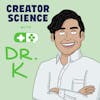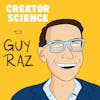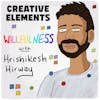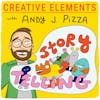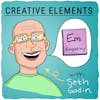
#18: MICK – The early days of being a DJ, building relationships, failing micro, and future-proofing your brand.
Play EpisodeMICK is a Brooklyn-based DJ, style influencer, tech investor, speaker, music curator, and brand consultant.
MICK is a Brooklyn-based DJ, style influencer, tech investor, speaker, music curator, and brand consultant. Inc Magazine referred to MICK as a “combination of Gary Vaynerchuk and Questlove.”
MICK has spun private events for some of the world’s most prominent celebrities and brands including HBO, NBC, Fast Company, Hillary Clinton, Instagram, Jay Z, LeBron James, Michelle Obama, and Prince.
In this episode we talk about the early days of being a DJ, running a college radio station, building relationships, and why his brand has helped him build his multi-hyphenate career.
Transcript and show notes can be found here
***
LISTENER SUPPORT
Join our community on Facebook
Support this show through Buy Me A Coffee.
***
SPONSORS
Try Podia and save 15% for life as a Creative Elements listener
Start your free trial of SavvyCal and get your first month free using promo code ELEMENTS
ABOUT JAY CLOUSE
Subscribe to my weekly newsletter
Enroll in my course on podcasting, Podcast Like The Pros
***
PODGLOMERATE NETWORK
This show is a part of the Podglomerate network, a company that produces, distributes, and monetizes podcasts. We encourage you to visit the website and sign up for our newsletter for more information about our shows, launches, and events. For more information on how The Podglomerate treats data, please see our Privacy Policy.
Since you're listening to Creative Elements, we'd like to suggest you also try other Podglomerate shows surrounding entrepreneurship, business, and careers like Rocketship.fm and Freelance to Founder.
Learn more about your ad choices. Visit megaphone.fm/adchoices
Mick Batyske 0:00
Find some sort of differentiation point that makes you slightly different than what everybody else is doing. So whether that is YouTube, like, are you doing something that's different? Everybody's doing but still kind of like also commercially viable, right? I think the true genius happens when you innovate in the lane that's already there.
Jay Clouse 0:18
Welcome to Creative Elements, a show where we talk to your favorite creators and learn what it takes to make a living from your art and creativity. I'm your host, Jay Clouse. Let's start the show.
Jay Clouse 0:43
Hello, welcome back to another episode of Creative Elements. We're exploring some new territory on the show today and we're getting back into the realm of music, but maybe not in the way that you think. Back in September of 2018, my other podcast Upside was listed in a fortune article recognizing some of the best business podcasts. I tweeted about it as you do with big news. And somehow that got the attention of a guy on Twitter named Mick who said congrats and call out the fact that we're both from Ohio. So I looked at his bio, which reads your favorite bands favorite DJ. And not only that, but it says he's an investor in a couple well known startups, including Anchor, which was acquired by Spotify, Localeur and Winc, it seemed like a really interesting combination of interests. And so as you do on the internet, I dug deeper into the rabbit hole. Mick is the stage name for Mick Batyske, formerly known as Mick Boogie. Mick lives in Brooklyn now but has done a ton of international traveling for gigs from New York and LA to Davos and con in London in Tokyo. Now listen to some of these names that Mick has DJ for. He spun private events for celebrities, brands and tech companies including Bravo, Entertainment Weekly, Fast Company, Hillary Clinton, HBO, Instagram, Jay Z, Will Smith, Jimmy Kimmel, LeBron James, Michelle Obama, NBC prints, Rihanna, Samsung, Spike Lee, Spotify, Steph Curry, Twitter, and Vanity Fair and that's just an abbreviated List of companies and names that have bold here. But he's also a fashion influencer with clients like Adidas, Bergdorf Goodman, Coach, Esquire magazine, Kanye West, Nike, Ralph Lauren, and W magazine. And it all started for Mick in Youngstown, Ohio, playing the drums.
Mick Batyske 2:35
When I went away to college, I was like, I can't bring drums to the dorm room. So I had a Michael Jordan rookie card sold it, you know, for 600 bucks found two used technique turntables into the one ads in the newspaper bottom. And I've changed.
Jay Clouse 2:51
That turntable was the beginning of Nick's DJing career. Not only does he do private events for some of the big names you just heard, but he releases his own mixtapes as well. For the last 10 years Mick has been releasing these incredible summertime mixtapes with DJ Jazzy Jeff around the Fourth of July. And judging from this year's mix in the intro from Michael Rapaport, who is an actor and one of my favorite TV shows Atypical. It must have been a little bit late this year.
Michael Rapaport 3:05
DJ Jazzy Jeff and Mick Boogie. Sorry, just Mick right Mick I can't call you. You bought DJ Jazzy Jeff. And make the Fourth of July annual summertime mixes late what's the problem guys? DJ Jazzy Jeff, you got Kofi? Is that what the problem is? Mick Boogie. Oh, sorry. Just Mick? Come on, guys. The summer doesn't start until the annual summertime mix by DJ Jazzy Jeff. And Mick drops. When you guys gonna let me do the intro, here it is. Cite France for just a little bit about what you've got. Guys come on.
Jay Clouse 4:06
Over the last few years, Mick has gotten into startup investing in a 2018 profile in Ink magazine called him a unique combination of Gary Vaynerchuk and Questlove. So in this episode, we talked about the early days of being a DJ, running a college radio station, how Mick thinks about building relationships, and why his emphasis on brand has helped him build his multi hyphenate career. I'd love to hear your thoughts on this episode. As you listen. You can find me on Twitter or on Instagram @JayClouse, or you can join our new private Facebook group by searching Creative Elements listeners on Facebook. I do want to let you know that this interview does include some strong language, so if you're around children, you might want to wait until you're alone to listen to this interview. All right, let's dive in and hear from Mick.
Mick Batyske 5:02
I grew up in Youngstown, Ohio, not too far from from where you're at with there in Columbus and I grew up coming of age of music in the 90s, where it still was my favorite to this day, my favorite era of music. And I distinctly remember my mom had lots of vinyl records. My grandma had lots of vinyl records. I didn't know anything about DJing at the time, but I knew I enjoyed playing them, even as a kindergartener, I had a case of like 45 and I couldn't even read but my mom wrote me on like one of them and I knew it was like my records. I just think that he had these touch points of like music my whole life, and then I play drums and I played piano. And at some point in high school, all that I kind of synthesized into, like one thing, I was like, I could come home from school, and put my Walkman on at the time, which became my Discman, and listen to everything from like Tribe and NWA to like Beastie Boys and Pearl Jam and Nirvana and I would play my drums to all of that stuff. And I wish everybody could see the video you're saying because you think my hands in the air drums. But you know that kind of like taught me rhythm based on pre recorded music that I love and then it which is different than rhythm playing and like I played in like Symphonic Band and jazz man and all that shit. And that was cool too.
Jay Clouse 6:13
When I was in school growing up doing like band and symphonic band, that was not the cool thing to be doing. Was that like a cool thing that people were like, Oh man, I wish I could be like Mick when you're in high school playing around?
Mick Batyske 6:24
No, hell no. Like, why am I in high school? The band was 280 people. So it was less horrible to say that than in most schools where it's like 30 kids, right? But it was still pretty bad. I was a nerd in high school. I was like super overweight. I was like smart but not like smart enough to like claim super nerd level. But my brain worked on that level. But I still wanted to be kind of cool, but I wasn't cool enough to be friends with the cool kids. I wasn't athletic enough to actually play sports like I was always like, one of the first people chosen at recess for basketball, but like I was never like shape enough to be like actually on the team. So I was like the proverbial like in the middle kid. Which looking back on it? I mean, it's actually awesome because it informed a lot of how I live my life. I live my life now like the nexus of a whole bunch of different things. Maybe I don't own one of them to the level that I should but I do think a lot of my success has happened because I'm able to reach to like different worlds. As a kid though it pretty much fucking sucks because like, you're just like, the cool people already think you have something to do today. Don't invite you to the party, but the nerd people think you're all going to the party. So they don't invite you to like the math on I'm making that up and then like, you know, like, you don't want to go back to band again. So it was a very weird upbringing, and I kind of fell in my refuge in music. So I would go home and listen to my cassette singles and my CD singles and I had a DJ mind state even back then before I knew what DJ was. So if everybody went and bought, went to the mall and bought a single of like, Apple song I'm making this up like a Beastie Boy song like when check your head came out. I would go to like the Obscure record store and buy the European import CDs single that had been remixed from Sweden that like no, this is pre internet and all that but data would give me like everything and then nobody gives a fuck, like at all I care. So people be like, did you hear check your head? I'm like, man, it's okay. But like, did you hear the remix that the guy from sweet, you know? And that but that to me was me thinking like how I think now way back then.
Jay Clouse 8:14
How did that become something that you were aware of existed? Like how did you know that Oh, they're doing different remixes of this in different countries and I'm gonna go find that.
Mick Batyske 8:22
Magazines because the internet was just starting, right and so you would get like we had Barnes and Noble had just come to Youngstown and we had another bookstore called I was actually way better than Barnes and Noble but it was like a chain It was called Little Professor. And I don't know if that was like an Ohio thing. I have no idea what it was. It was a pretty big bookstore. And they had magazines that would not just like Rolling Stone and spin and vibe. They would have like obscure New York stuff. They'll get like one of them and then occasionally they would get some shit from like Europe that would be like triple the price. Because that imported be like 17.99 for like a magazine. But it was awesome because they were have like all like the dance charts and the hip hop charts from all these foreign countries. And they would have like reviews of albums. Sometimes they weren't even out yet in America, but it was just, it was the internet before they read the internet. You know, it was really cool. And then I went from that into doing college radio when I went to John Carroll in Cleveland. And that too, was like an interesting version of like, getting things early to college radio at the time was a super relevant pipeline for music. It was really the only pipeline it was, what blogs were 10 years ago. And what playlists are now it was like, we broke the records, commercial radio and never broke records. Very rarely, college radio broke all the records in every genre.
Jay Clouse 9:37
Why is that is that just because you have the control to put on air, whatever you want to put on air.
Mick Batyske 9:41
You have the controller upon which you want to put on you don't have to worry about consumers. You just have to worry about dinosaurs, right? So you don't have to worry about we need to keep the average person listening because we need to have this commercial for a car or for bedbugs or whatever. You know, you know that horrible commercial radio is the worst commercial ever, you know, there's a reason those stations play those songs 40- 50 times a day. There's like a science to that. And it's true like people like me became a DJ because I didn't give a fuck about hearing the same Nelly Song 50 times in an hour in 2003. But most people did. Like, you know, there's a reason we were DJs and they were to be the reason people came into my parties. And the reason people bought my mixtapes is because they wanted that stuff right. Now, it's a little bit easier to have access to like new and cooler stuff. So people are a little bit more well trained to expect better things. But what I learned was that like, you know, to the basic, like marketing funnel, you can go over people's heads, you know, from a marketing standpoint, from advertising standpoint, from a music programs four point, fashion, you name it, it's the same formula. And so you kind of have to find a way to appeal towards the common denominator while still being upscale and fluent and ambitious, too. And that's how that's been the secret for me. It's like, you got to stay relevant to everybody, but also make people want to move in the direction that you're moving, but you can't go too far you can't you know, I know a lot of people who like trying to appeal to like the common denominator person. And they're doing all these Instagram ads or like Lamborghinis and shit. It's like, bro, that's not right for you.
Jay Clouse 11:07
That's too inaccessible.
Mick Batyske 11:08
That's too inaccessible. Like for me, I keep my branding has always been very simple. Like, I'm a DJ, I'm a dad, I do entrepreneurial stuff. You see the best of my life. You see, sometimes you see the worst of my life, but I don't really hide aspects of my stuff. I don't ever want to have a branded and authentic.
Jay Clouse 11:25
Before we dig deeper into mixed DJ career, I want to look a little bit deeper into how he got there in the first place. Because when we left off with his story, he was in college and had just bought his first turntable. I don't know many people who would think of college as the path to becoming a professional DJ.
Mick Batyske 11:43
I thought I was gonna do a finance degree first and foremost, that lasted about a semester. I was like, No, these are these numbers are not my friends. We're not going to do that. And then I switched to marketing. And I felt like a real affinity for it. It didn't involve a lot of work for me to do that because it was on my brain already worked. It was just tightening it up and heightening it slightly. I even remember back in high school doing get a neck there were like some career thing we did like our junior year, we had to go interview like a professional. And I interviewed the head of PR at the time for Edward de Barlow. And they, you know, they like all the malls and the 40 Niners and all that stuff. And she was kind enough to give me an interview. And I didn't even I don't know what made me choose that at the time to be completely honest with you. But when I look back at it, my interest in the marketing side, definitely had a genesis even back to high school, if not earlier, and then in college, and it switched to the marketing degree. That opened my eyes to a lot of things. I do think looking back in hindsight in retrospect, having marketing knowledge coming into my brain. Well, I was creating a personal brand with that we didn't call it that then for my DJ career. I think it was like having two parallel trains going on the same tracks but I didn't, I didn't realize it at the time and they were feeding each other. So I was getting real life experience and what I've learned In class, but it felt more like an extracurricular, my extracurricular stuff was doing better than most people's extracurricular stuff because I was getting it reinforced what what I was learning. And then I graduated and then 911 happened. So I was like, well, this seems like a good time to just keep DJing a little bit longer, rather than get a real job because the world is kind of like fucked up at the time, not too different than what we're going through right now. Like, these kids are going to come out of school this year, and they're going to enter a transformed world. But for me, I went to grad school continues to fortify the knowledge of through marketing and MBA marketing of what I had already learned, well, putting all that energy and time back into my craft, because I was using my craft of fun grad school. So I took a long time. And then I finished that with a lot of education and a lot of real world experience. And I don't think my life would have worked out the way it did if those things weren't always running parallel.
Jay Clouse 13:49
So you were making good enough money DJing to pay for your grad school.
Mick Batyske 13:52
Yeah.
Jay Clouse 13:53
What was the thought process in your head to say, I'm going to double down on my education versus saying I'm going for this right now. And I'm just going to DJ and make my living doing this.
Mick Batyske 14:02
I had the time and those in the luxury to do it because DJing at the time, it wasn't like now where my life has kind of become this like 360 thing at the time. I was 22-23 in Cleveland in the mid 2000s. There just wasn't a lot of other things to do. If I wasn't going to DJ like a night for a couple hours, I didn't have like interviews during the day I didn't have there was no social media. There wasn't like I wasn't working on other things like I'm working on now. I didn't have a good kid. Well, you know, there was like, I had nothing to do like I didn't it's not like now where I work with these brands. And I'm like it's like so much relationship maintenance and going to lunches and like I run my life now like a real business. There's like meetings and lunches and, and networking and flights. And I didn't have any of that. Then I just had two or three days a week, right? And then I prep for them for like a half hour so I had plenty of time. The barrier to me getting my work done was very, very low. So it just seemed like a really great time for someone. I was always a big education person. You know, I believe I tell my kids every day he's only four and a half but like tell him You're going to go to Harvard one day, I bought four or five size Harvard sweatshirt that would, you know, give to maybe on his birthday, like this is, you know, who knows if he really goes there who knows that it should even exist, but like, I set that tone for him because my grandparents set that tone for me. And I'm not saying I'm going to be like a helicopter dad, like live your life. Do what you want. Within reason. I will of course correct the fuck it though to the way left. But I'm very big on like empowering him to make you know, even even for that, and I let him do what he wants, as long as he can explain to me why he's doing it. And that's what my grandparents and my parents did for me. And it worked out if my parents didn't let me listen to like NWA in sixth grade and try to like shelter me. That'd be crazy. My life might not be who I am right now. I bought so many of my first tapes and CDs that inspired me to do this because my grandparents, they used to live in Florida that half the years have gone on in Florida for a month at a time and I get to do all the shit my mom would never let me do my grandparents would just drop me off at the mall for three hours but they had bikes and I would ride really far and go like these obscure record stores I could never do that like where we live in Ohio. They gave me the autonomy to do it. But if I fucked up once, then it was done.
Jay Clouse 16:08
After the break, Nick talks about leaving his small town of Youngstown, Ohio, and taking his DJ career to New York, right after this.
Jay Clouse 16:17
Welcome back to Creative Elements. Throughout his time in college, Mick had been doing gigs as a DJ while also running his college radio station. But it didn't take long for Mick to decide that being a DJ from Ohio, only DJing in Ohio wasn't thinking big enough.
Mick Batyske 16:33
Right after grad school, I was like doing everything you could possibly do in Ohio. I was actually in Columbus a lot doing stuff too. I did all the Cavs games. I did all the bronze early stuff. I did all the Rock and Roll Hall of Fame stuff, everything you could do in Ohio. I did it and I did it a lot. I did it too much. And I got to that point where I was like, let's see if we can move this somewhere else. Right. Let's give it let's give this a shot because you have one chance to really try to do it until leverage every single relationship I had ever to get to myself to New York. And I said, if it fails, I can either get a real job here, using my education, I can get it, go back to Ohio and get a real job and probably have a higher quality of life or go somewhere else. But I had a plan B, and C. So I was like, there's never going to be a better time my stock was like really high at the time for Ohio stock. It wasn't going to get better than that. So I was like, I might as well just do this right now.
Jay Clouse 17:28
How did that stuff happen? I mean, I know that you're in Cleveland, you're you're like making a name for yourself there when you say I did all the wrong stuff. I did all the Rock and Roll Hall of Fame stuff out of those things come to be and what does that actually look like for people who aren't super familiar with the DJing world?
Mick Batyske 17:42
Sure. Well, it's not like now where there's DJs on like, fucking Taco Bell commercials and DJs on like children's Saturday morning cartoon stuff. Like it just wasn't that sort of world right? where everybody's a DJ and I it was like, it was a very rare thing to be a DJ and it was a very hard thing to be a DJ and it was very hard to access to music even to be a DJ at the time using vinyl records and all of that. So you had to like there was a huge barrier of entry and a huge dupin thing so that it wasn't now what we're getting you everybody knows that 100 DJs, then everybody knew like, three, maybe five, maybe one, right? So you had to be really, really, really, really good at what you did in order to rise to the top and you had to be like, really, really, like smart and efficient with how you did your relationships, because people weren't really checking for DJs. But because I had a career where I did college radio, then that led to commercial radio than I did all like that led to me doing all the bigger nice, nice things in Cleveland and that lets me meeting a lot of people. And again, there was no social media, there was no anything at that time. So it was like, Oh, this guy's always at this party. This guy's always a display. This guy's always at this party. And then when people come in town for like, as games or like the rock Roll Hall of Fame, inductions or whatever it would be, they would always see me because I did all the parties. And then that led to like friendships and then that led to relationships. And then that's like, hey, well when you guys do something maybe you could think of me happy be part of it. And at the time, people were getting less apprehensive. We're having DJs at their events that used to be like people had like bands. So people have like a jazz band or like a singer. And then it became like, Oh, we should have a DJ, that'd be really cool. And also what happened at that time was, music became more global as far as like, what brands are accepting and what consumers are accepting. Meaning that hip hop at a public branded event, like before 2000 was like non existent unless you're playing like, top 10 Records like or like Hammer and shit like that, like in the 90s. I don't even know what it be like. It was, you know, at that time had been like a wedding. But then it became like, Oh, actually, hip hop became like the number one genre music in the world. Everybody listen to it. Everybody listened to different variations of it. There were kids that lived it, but your grandma knew who Biggie was right? And so she didn't know the song but if she saw Biggie or Tupac on TV, she's like, I know who that is. And that's a huge difference. So when that happened, the brand space opened up to DJs to multiple Cultural music being infused in it. And that changed a lot of the game.
Jay Clouse 20:04
It sounds like at this stage of the game, this stage of your story. There must have been a ton of people around you who just didn't get it. Like they just didn't know what you were doing.
Mick Batyske 20:12
Yeah, like, nobody got it. My family didn't get it. I mean, they, I mean, they said they get it, but like, I didn't even get it. My grandparents didn't grasp what I did until I was in the local Youngstown, Ohio newspaper, like 10 years later, right? And I said that and I did it wearing I came back home and I didn't I did it wearing a Yankees hat just to be a dick. Like it was just just to spite everyone. I did it. I literally plan the whole shit. I was really horrible. Brooklyn t shirt and a Yankees hat. Because I wanted I really I literally did it to be objective. It's kind of funny though. And people call me out on it. Like all my old Ohio fans, like, really? I'm like, really? Indians have always suck. But anyway, yeah, nobody got it. Nobody got it.
Jay Clouse 20:54
How do you how did you deal with that? I mean, everybody wants their parents to like be supporting what they're doing. Everyone wants their friends to be supporting. What they're And you're probably facing all this like, dude, we quit screwing around with these friggin vinyl records and just come hang out.
Mick Batyske 21:06
Yeah, I mean, you know, for me what it was, every it's not that people didn't support it like no, it was hard for them to understand it because it was never it never existed. Right? And so it's not like my, my grandparents, my parents have buy me drums, my mom was very supportive and helping me get records. My mom helped me carry records of my college radio. So like, you know, they said, everybody supported to the level of their mental attitude of what was actually going on. But I you know, behind that they just had no image, it was just like, you know, I'm just turned 42 my kid is going to be into shit in five years. I don't know what it is, and I'm on the pulse of everything, but there's just gonna be stuff I don't know. And I'm gonna be like, I don't know what you're doing right. And so like, it's kind of like that mind state or that framework 10, 15, 20 years ago, and I've always had a vision of where I wanted to go. And I've always put myself a couple years ahead of where I'm at. I've always put my brand aiming towards where I want to go. So when I was in Cleveland, right when I was in college, I always positioned myself as a college student slash DJ, not just a college student doing a college radio show, because I just loved the culture of what I did. And then when I was in grad school, I was like, Oh, I'm going to be like, the smart DJ guy in Cleveland. And then when I put all that together, I was going to be like the global DJ, who happens to live in Ohio. And I wasn't global at all. But what happened was that got me from Cleveland to Columbus, and that got me from Columbus to Cincinnati. And that got me into Detroit. And then that got me to New York, and then Chicago. And, you know, because I positioned myself that way, the ball started moving down the court that way, and then I moved to New York and I did the same thing. Okay, I moved to New York, I was only doing nightlife mixtapes had died mixtapes that became illegal, and they were doing like raids on DJs and shit. So that's what kind of died or went online. So I was like, I'm going to be the guy that's doing this doing that, and then it went from that. So I'm going to be the guy that owns the entrepreneurial lane of DJs. like nobody really tried to do that and five years ago I made a drastic decision to reframe my whole branding. I kind of had to recheck my authenticity. And I was like, why am I not the coolest guy in this room? Why am I not the coolest guy in this room? Why am I not the coolest guy in that room? Now think about what I'm saying though thinking about this back to high school, right? I wasn't the smartest kid I wasn't the nerdiest kid, I wasn't the most talented guy in band. I wasn't the coolest kid I was, you know, I wasn't the most athletic kid I was in the middle, right. And that was the same thing that I was dealing with. Now as an adult, where, you know, I'm doing all these things, and I'm a member of all these worlds, but I'm not so much of a member of these worlds that people identify me with these worlds. And I always want to have all those touch points, but I hated I had to find something to own. So I realized if you look back on my whole life and think about everything we just talked about, all of that led to this. I've always been the smart guy. I've always been entrepreneurial. Looking back to working for my grandpa in high school. When you go to pharmacy watching my dad had failed business after failed business and watching my grandpa have successful one after successful one, having my own failed newspaper in college having you know, successful cars radio show in college like blah, blah, blah. They extrapolate that until today. And that's been a situation from my whole life. And so I kind of like leaned into that and it worked out.
Jay Clouse 24:08
Over the last several years, Mick has been really intentional about repositioning his brand as not just a DJ, but a DJ who thinks like an entrepreneur. And what I love about Mick's approach is that he's not just intentional about his brand, but he's also aspirational. A lot of people think about positioning after they've already built a certain reputation. But Mick actually leads with the brand and leads with the positioning and then aligns the way that he lives with that positioning. So I asked Mick how he avoids fear or the trap of imposter syndrome, when he's thinking aspirationally about his business and brand.
Mick Batyske 24:41
I think I still have imposter syndrome. certain ways, you know, I don't think that's bad either. I think you have to own it. You know, and I think we have it in multiple ways. I mean, I even have it like a dating now again, after 10 years, not that I'm like, how is this person even talking to me? And then my friends would be like, why would this person like not talk to you? But in my mind, I'm just like I don't get it, you know, and it's the same thing with music like sometimes I'm just like, you know, how am I at this good? Like how did this really happen? And you know, I would say, the way I've I've battled that or overcame that. I had a good therapist when I say this all the time said it's like an every interview is the best advice anybody ever gave me. If I was going to fail, like I would have failed a long time ago, I would have failed when they told me I couldn't get a college radio show I would have failed when I was in grad school trying to be a DJ and pay for a fucking DJ when nobody was a DJ. I would have failed when I moved to New York with like nothing but I was just an Ohio guy trying to like make it big and like the biggest city in the world. I never failed. I failed micro I never failed macro. And then even as we moved on from there, it's like every day I fail five times today but like in the hole that's why I'm not even worried too much about this virus thing like kids college fund. Well, we're going to be pulling from that and retirement we're going to be pulling from that because I you know, I saved six months of nobody saves like they say like save a couple months. Nobody said this shit, but I will be fine, long game. Because if I was going to fail, like I totally would have failed. Now, you could also argue, am I saying that? Because I know in retrospect I haven't or is saying that actually transforming how you move moving forward now that I know that that's kind of been the pattern for my whole life. And that changed how I move is that change the energy of people that have come into my life to help me that changed the decisions I made, the creativity I made? You could I think both ends of that have happened. So knowing that I think that mindset allows me to make bolder decisions or sometimes make more conservative decisions, you kind of create your own destiny in that way. I do think that because I believe that ultimately I will fail in the big way It enables me to drive the car down that road. And I think if I looked at like my life as a series of micro failures versus a series of macro wins, I would drive slower and choppier. And I don't I drive full speed ahead note with bumps.
Jay Clouse 27:00
When we come back, Mick and I talk about how he thinks about building relationships, and how he's gotten to work with those A list celebrities, big brands, and more. Welcome back to Creative Elements in my conversation with Mick. I told you in the intro that Mick has been events for Jay Z, LeBron James, Michelle Obama, and a whole host of other big names that can make your head spin on very much intended. Obviously, just about all of us would love to work with brands and celebrities like that. So I asked Mick how he gets those opportunities.
Mick Batyske 27:33
It's all relationships. And it's all I mean, talent talent. Number one, you can't suck, but you don't actually have to be great. You just have to be good. And this is another thing I learned in high school. I would rather be the guy getting all B's and going home and playing my drums and go on and working for my grandpa rather than be the person getting A. Same thing in college. I'd rather get the B's have my college radio show, go do the parties at night and when I said go to the parties, I was never a party. I just recently became the person who drinks way too much wine like two years ago, like I never was a partier, I'm still not a partier. I'm still probably the least happy person in a club to this day, even though I'm the one didn't pay. But for me, it was more like an artistic expression thing. So I was like, I would rather be the guy making the beat and doing all this other stuff, rather than being the person making A and being very singularly focused right now we celebrate that and we call this like multivitamins, back then I was a fuckup. Like, why? What do you mean? What do you mean? What do you mean, you didn't study for calculus? I'm like, cuz I have enough brains to get a B, I'd rather go out in the world and like, study the life. Right? And so when I look at my career, it's kind of the same thing in that like, I've told the story a million times, but it's so important and it's so timely, really so many different industries, right? Because everybody's doing their creative hustle now and everybody's doing these things. And one thing I love when people say is like, literally just do your shit and put it out in the world. If you keep waiting and waiting and waiting. No one's ever going to hear it and I just so many DJs in Ohio, and even now in New York, who they're way better to me. And I don't mean necessarily better me than like reading a crowd and playing song. So there's people better to me than that too. And I don't mean he did that are way better to me as far as the song selection they have, because they're definitely does better than that, because they spend more time like looking for songs and stuff. But just from a technical standpoint, I knew these days, I could scratch with their toes and take their shirt off, or they're spinning around and go on like all steel, watch all those old YouTube videos. I can't do any of that stuff. But they, they're broke, right? And they're working a nine to five and nobody ever hears them. So it's like, it's so great that you could do that stuff. Cool. And if that's if you're if it's truly just about that for your you want to do that. That's awesome. I wish I still had that pure, unadulterated love for it. And I do like, at times, obviously. But my thing was always like, cool. I'm going to be the friendliest DJ you ever meet. I'm going to be the most marketable DJ you ever meet. I'm going to be the guy that actually, I'll play your request if you're not a fucking dick. Like if you're nice and it fits in the context of what I'm doing. I'll play it. Because who knows who you are man, like, first of all, like, you know, I'm not going to change course of what I'm doing to play your requests for like dj type requests. I'll play it because what if your dad is the Sultan of Sudan, which doesn't even demand doesn't even have salt? And that's like a nice alliteration, right? Don't make that the title of this podcast, but, but you know, I've met so many amazing people, because whereas people think there should be this barrier, because I'm DJing I'm like, hey, yeah, sure. I'll do that for you. Oh, cool. Oh, yeah. What are you drinking? Oh, cool. Let's let's do a shout out, you know, just being human. It's been a huge aspect to my career, and I put the human aspect first. And that's where my opportunity to happen. So to go back to your question, it's like, yeah, the DJ is cool, the music good, whatever the marketing is the blah blah, blah. But like when I you know, I'm friends with more of my clients and not friends with more my clients, even if they didn't start off that way. I had a Christmas party at my house this year. Half the people in the house. Cut me a check. I didn't look at them as check cutters. You know when I had a baby shower years ago when my son was born, half those people were clients at one point or future clients, but it was never looked at that way. And so for me, that's what I do. I just really try to like keep the human aspect of it first. And that's the opening doors aspect for me, because everyone's a DJ marketing is much easier now with social, but can you be a good person? Can you be a human? Can you remember? Like, you know, and I fucked this up all the time to like, I forget people's birthdays and stuff, but like, I try to do the best I can. And it seems to be good enough.
Jay Clouse 31:33
On a double click on that a little bit, because I totally agree. And everything that's worked for me has been based on relationships too. But what people I think, don't realize or don't hear when someone says all about relationships, they think it's okay, well, how do I run into Jay Z to start that relationship? And they're missing the point. It's not about, you know, you have to have a relationship with this big name. It's relationships with people and then eventually you just have more people.
Mick Batyske 31:59
And I think also people overshoot like Jay Z doesn't even know who I am. Like I did some parties from back in the day. Like he's seen my name on things. He's been at parties I've done since I've done events for him. You don't need to know him. That'd be nice. I wish I did. You know, I mean, he probably would remember the parties. It might remember there was like, somebody that looked like me at those parties if he enjoyed the music, right? He's not going to but he you know, that's not where I'm at. Like, I don't have a life where like, I could call somebody like that. I mean, certain people I do like I saw LeBron over Christmas in LA, and it was like, he started talking like it was 10 years ago. He's a different breed. That guy's a mental maniacal genius. Like he remembers everything. He remembers players from high school. So like, you can't I can't even chalk that up to me being memorable. But for the most part, you know, I got to do an event for Michelle Obama, because I made friends with the right people who made friends with the right people. And then I went in there and I'm, you know, did a good job. She's not remembering that but it doesn't matter, right? Nobody it doesn't matter that I did it. It didn't matter that I did it. Because of A I put the time in for my talent, and I put the time in for my relationships. And that led to that opportunity. And so I think the way I do it works really well for me. Now, other people, it won't work as well for them. But for me, it's like, I know that my way of doing business is the exact way I'm supposed to do business to succeed, and it's applicable to other entities.
Jay Clouse 33:21
One last question on this, then we're going to get into some of the investments you've made and how you segued into tech a little bit. But let's say that there's another DJ coming up in Youngstown or even somebody is just doing some type of creative work somewhere in the country. The world has changed. You know, there is social media now. But relationships are still the same. What would you tell them about how to make a living for themselves and not be just that guy that's really technically good, but still working a nine to five, what would you tell them how to leverage some of these tools to make it go for it?
Mick Batyske 33:52
I would say find some sort of differentiation point that makes you slightly different than what everybody else is doing. So whether that is YouTube, like Are you doing something that's different? Everybody's doing but still kind of like also commercially viable, right? I think the true genius happens when you innovate in the lane that's already there. So, you know, very few people are going to have the ability to create a whole new thing. And we definitely need those people. We do need a guy who says yes, possible go to space, or Yeah, it's possible to do this, we need those people. But those people are outliers, right? Most of us just need to be really, really good at what we do, and then change the game slightly. So if you're the person that invented the phone, we can't all be that. But you could be the guy that invents the app for the phone. That's a lot easier than the iPhone, but you're actually at probably affecting just as much change if you invented Twitter or Instagram versus of any of the entire phone. We don't need to invent the phone. We just need to change the game slightly. Like sports like everybody shot threes before stuff, but nobody shot step threes like that nobody took eight feet behind the line. He did that and now the whole game is opened up like that. He didn't really do anything that day. You know, he's like he didn't change. All he did was take something very basic fundamental that everyone skipped shooting, everybody has wanted to dunk. And he just did slightly better. And all he did was moved back four or five feet. All he did, he moved back 48 inches, and it changed a trillion dollar industry by him moving back 48 inches. That's what he did.
Jay Clouse 35:19
I love what you're saying about being commercially viable, too. Because some people will say like, I'm the best at doing this thing. And I'm doing it different than anybody else. But they won't think about okay, but who who finds that valuable? Who's gonna pay you to do that?
Mick Batyske 35:30
Yeah, well, some people don't care about that though, which is cool. But like I do.
Jay Clouse 35:35
And if you want to do if you want to make a living doing it, if you don't want to have a nine to five at the same time, you kind of have to.
Mick Batyske 35:39
Yeah, selling out is cool. If you sell out the right way. I'm all for selling out as long as you don't sell out with your with your integrity. In fact, man, that's the that's the perfect scenario, right. And every successful entrepreneur has done it. Every big business that has done it most small businesses have done it and any creative that you actually know about has done it in one way, shape, or form.
Jay Clouse 36:01
I wanted to spend a little bit of time talking about the most recent repositioning of Mick's brand and his interest in startups and investing. And so I started by asking about where that interest came from in the first place.
Mick Batyske 36:13
I just started hanging out with a lot of people smarter than me, because of how DJing went because I decided I wanted to own the DJ world of like, we were talking before, like the smarter world entrepreneur world, inc. and fast company world, because I saw where that was going. And I saw that the Gary V's of the world were becoming the new Jay Z's of the world, right. And I saw how people were looking at them similarly, and I saw that I was living at that nexus point. So I started hanging out with a lot more people on that side of the fence, because those people were also very into the same things I was doing. Like I can go talk to a 42 year old venture capitalist dude, and he's gonna listen to half at least half if not more of the same shit I listened to not he's not going to be me, right? He's not gonna and also something similar that he's not going to have like my sneaker collection, but he's going to have some sneakers and there's a good chance that he has 10 pairs of sneakers, he might not even know. But two or three pairs of what he has might actually be really dope, but he might not even know. But like he bar, he'll have some context of like, oh, when those Jordan came out, those were really like fresh. And it's just a different world. So I was able to speak to them, because they understood me versus like, 20 years ago, my grandparents story than before. And I was able to understand them because of how I approach my business. And because I was educated. So that just led to a lot of conversation. And that led to a lot of relationships and friends. And it's the same thing as DJ, hey, you should know this guy, you should know this guy, you should notice that some of these people hired me to DJ, some of these people just wanted me to be their friend. Some of these people ended up putting me on panels when we did more thought later things and then somebody stupid, like you should know this guy because he's working on this thing. And there you go.
Jay Clouse 37:47
What about this decision to actually, like actively invest in some of these companies, something that you you didn't have a ton of experience with before? What gave you the courage or the confidence to say yeah, I'm going to do this now too.
Mick Batyske 37:58
Do to protect myself. You know, learning about things, trusting my gut, I am still not a great numbers person. I'm not a bad numbers person I'm far from a great numbers person, I'm much more of a human person than a cap table person. You know, like, I could definitely look and see if your idea financially doesn't make sense. And I definitely have smarter people than that, who could look at that for me and be like, stay that buck away from this person. Right? It's like dating right? Like you'd be if I sit down with a founder, right? And I buy with them. I go off of that because I think you're going to figure shit out if you're a good person and you can figure things out and you could do the things that you need to do to pivot and course correct and adjust. And I'm not too too too worried about your idea because Anchor which I'm not part of anymore, they got bought by Spotify, but that was a huge win for me. That is now going to be zero because of that. Thank you. Thank you. Coronavirus. I think that that wasn't what it was when they got bought when they started. It was like three, three, it wasn't even iteration there was like a different thing you know, in this company. The first company I invested in dot dot dash, they do amazing like exponential VR robots lasers, like, 3d shit. They were a photo app, you know, but I knew that kid would figure it out. That's just what happens is it license figure out, this is what I tell my kid every day. This is how I approach friends is how I approach dating, like, you know, if we go on a day in restaurant pose, and you can't look at your phone and figure out somewhere else to go, like, you freak out about it. Like we're not going on another one. But you know, because I, what are you going to do when you get sick? What are you gonna do in a pandemic? What are you going to do when you get tired? What are you gonna do? Like, you just figure it out? It's not too different than DJing. And again, it's a really weird how my life is all tied back together, you know, I DJ, I play a song. It works great. I stayed on that path. I play a song, it doesn't work. I have two choices. I could stay with it a little bit longer and play a couple of the songs of that type and see if I can get people going in that path. Sometimes I do that sometimes it work. But what happens is when I start to notice that I can kind of like course correct and adjust and it's the same thing now that people look at what analytics was like marketing and social and all that. stuff. It's the same mind state, right? Do you want to how do you how do you fix that? And that's the same thing that I think a founder need to do, right? Like, the idea is not working. Cool. How many people are walking off the dance floor? Okay, cool. Only a couple, maybe we'll stay we lost 10? Will maybe we need to change it but is it the song? Or is it the artist? Or is it the vibe or the drinks and moving that into this? It's the idea. Is that the branding? Is it the timing? You know, it's so similar.
Jay Clouse 40:25
When you started diversifying yourself and future proofing yourself in this world of tech, kind of do you think about reconciling or changing or evolving your brand you know, a lot of people will think well, I'm known for this over here. I can't do this because people know me for this over here and it seems like you very quickly course adjusted to not worry about that.
Mick Batyske 40:44
But the main thing I did was like hey, I treated my my whatever your name and I made sure it was the name that was future proof. I made well my DJ name and college and now I be Mick Boogie which was like a very late 90s names I dropped the Boogie. I was like, I'm really lucky that my name is Mick and apply to different things are speaking. Whether it's whatever and then I could add my last name back on for things like this, right? And then I just chopped the last name off when it comes for more performance space, like endeavors, right? So I was lucky enough that if my name wasn't I would have just found something else that worked right in that regard, you know, stage name or surname, something that was future proof, correct. A be like this. And this is huge. I took the DJ off of my name. There's very rarely any media that has the word DJ, occasionally people have it because they need to understand that that's what I'm doing. But even on that point, if you look a lot of flyers and stuff on the line, I have them right, DJ set by Mick or music by Mick. Because I didn't ever want to do again, it's going to happen sometimes. And I've learned to make peace with that because at the end of the day, I am a DJ. So it's like we get it but like, if you remove that from it, then you're no longer pigeon holed by what box people put you in. And that also again is another example of me putting on the horse. I'm just always trying to like move it, move it down the direction of where I want to go. So by removing proceed notion proceed. You know, it was it was much easier for me to do that. And it's the same thing with startups. If you are if that photo app company was named like I don't know I'm making this up but if they were named photo right or like best photo or like photo.io you know you got a rebrand the whole thing like seven times but if you're a company with name I'm making this up like Venus there's ideas and it's like, what the fuck is this venus? What the fuck is a goop? What the fuck it you know like you if you have a name, it saves you on the rebranding it because you don't know how people gonna use your product. They don't know what you're going to become. So if you have a name that is very fluid, you're able to transition and stay the course versus having spent all that time effort money perception effort into into rebranding who you are. And that for me was huge. And I tell you did that I tell founders that you know everybody because you don't know where life is going to go. So the more things you can do to future proof yourself from not just they've been perspective and a financial perspective. But also from a brand perspective. If your brand's not right, you can forget about money in business, right? You have to have the brand stuff first and foremost, in order to ever think about future proofing yourself as far as the other aspects.
Jay Clouse 43:13
What about the people that are following along? And they're like, I know, Mick, I know he's about but now he's talking about startups and stuff, like. Did you think or worry about them? Not understanding that you're evolving or changing?
Mick Batyske 43:25
No, I mean, to an extent I still try to stay relevant to everybody to certain ways, but I think a first of all, younger consumers of culture understand the need for business and future proofing themselves more than ever. Jay Z started talking about good credit. And everyone's like, Oh, yeah, right. Like your parents tell you to wear a nice shirt. You don't want to do it. David Stern told the NBA to start getting dressed up nobody want to do it. Jay Z said 15 years ago, stop wearing sweaters and start wearing button ups. Everybody started doing it. It's how things are explained to people and how things are received culturally. So you can people started being much more of the younger generation accepting to like longevity all of that stuff and then on the other side like you know my audience is not at 19, 20 year old audience I can do that I have that I could kill that but my audience is more so like the people who are the probably either people like me now who came from either where it came from or they wish they follow their creative I hear from so many people way more successful than you and I and so many people you're probably gonna interview combined who have told me man, I really wish I would have did what you did. And I'm just like, bro, we can trade any day you want. But like, to me that mean? That's really cool to hear. And so like so that tells me they're getting something from my weird little piece of the story. And then of course, I'm getting stuff from from their pieces of story as well, too. So yeah, I don't really worry about that because I think that today's youth is much more savvy than we ever were ever. And I think today's middle age audience, which I guess I'm now a member of much more culturally relevant and youth minded than this demographic has ever been. So it's awesome if you're me if you're you if you're a brand who understands both sides because you could live infinitely.
Jay Clouse 45:19
I really enjoyed this conversation because it's always fun to hear a good origin story, especially when someone is at the front end of a trend. And I loved hearing how Mick got into mixing long before the internet made things easy. I think a lot of us can relate to Mick's story about never being the most x or the best y, but instead always living at the intersection of x, y and whatever else. There's a ton of value in being at the nexus of a few different skill sets or points of view. And Mick is evidence of just that. I highly recommend checking out the full summertime mixtape that Mick released just a couple of weeks ago with DJ Jazzy Jeff and the link to that is in the show notes. In fact, I'd check out all of his past mixes as well as his swimming pools mixtapes. You can find all those links at Mick.co or in our show notes here. You can also find a transcript for this episode and a link to our private Facebook group where we can talk about this episode as well. Thanks to Mick for being on the show. Thank you to Emily Clouse for making the artwork for this episode. Thanks to Brian Skeel for mixing this show and creating our music. If you like this episode, you can tweet at me @JayClouse and let me know or find me on Instagram @JayClouse. And if you really want to say thank you, please leave a review on Apple podcasts. Thanks for listening and I'll talk to you next week.
Most Popular Episodes
New to the show? Check out some of our most popular episodes.







